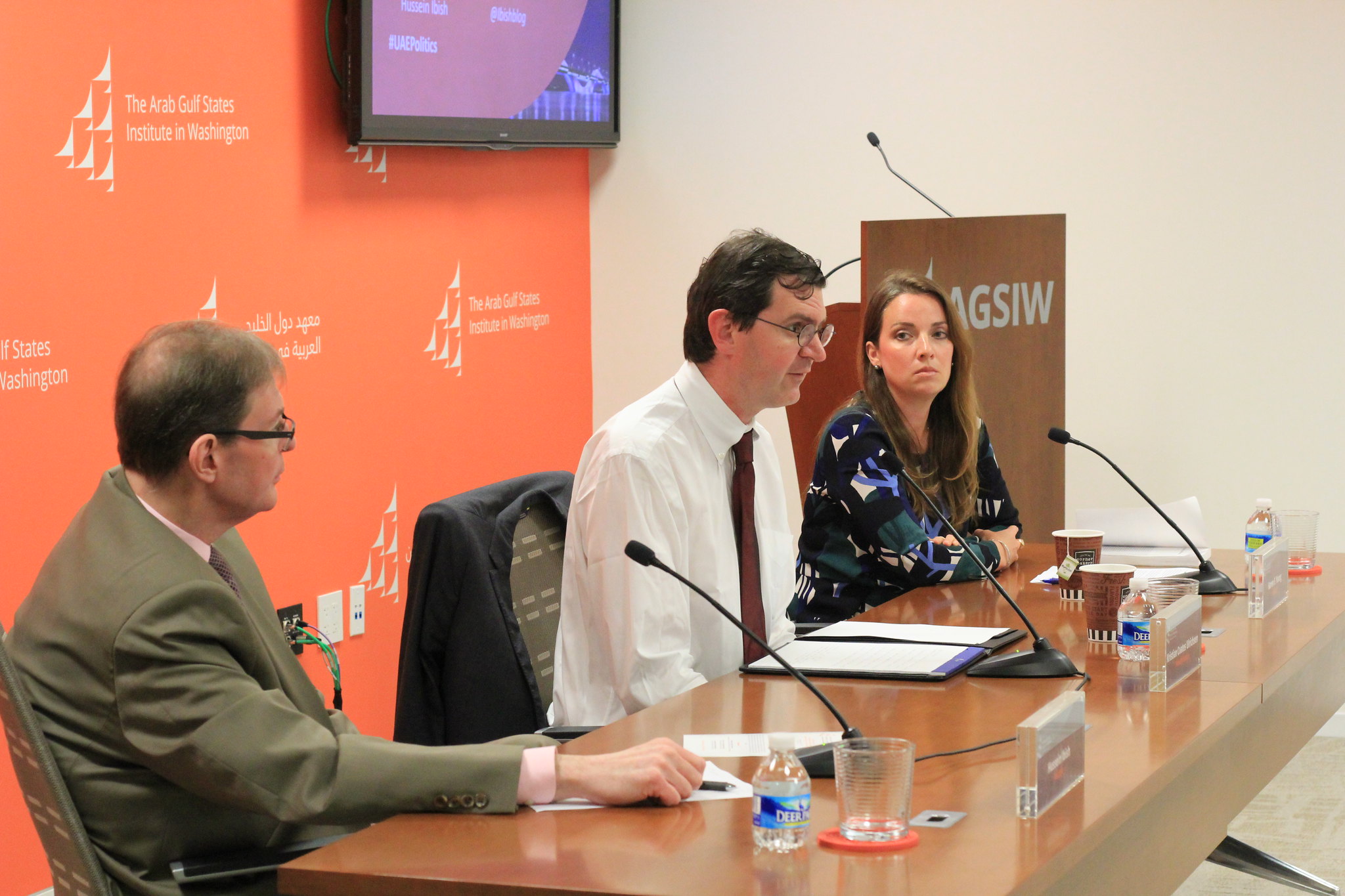The United Arab Emirates: Power, Politics, and Policymaking
AGSIW was pleased to host a panel discussion with Kristian Coates Ulrichsen, author of The United Arab Emirates: Power, Politics and Policy-Making.
AGSIW was pleased to host a panel discussion with Kristian Coates Ulrichsen, author of The United Arab Emirates: Power, Politics and Policy-Making. AGSIW Senior Resident Scholar Karen E. Young served as discussant and Senior Resident Scholar Hussein Ibish moderated the panel.
Led by Dubai and Abu Dhabi, the United Arab Emirates has become deeply embedded in the contemporary system of international power, politics, and policymaking. Only an independent state since 1971, the seven emirates that constitute the UAE represent not only the most successful Arab federal experiment but also the most durable. However, the 2008 financial crisis and its aftermath underscored the continuing imbalance between Abu Dhabi, Dubai, and the five northern emirates. Meanwhile, the post-2011 security crackdown revealed the acute sensitivity of officials in Abu Dhabi to social inequalities and economic disparities across the federation.
In The United Arab Emirates: Power, Politics and Policy-Making, Kristian Coates Ulrichsen charts the various processes of state formation and political and economic development that have enabled the UAE to emerge as a significant regional power and major player in the post-Arab Spring reordering of Middle East and North African politics, as well as the closest partner of the United States in military and security affairs in the region.
Panelists:
Kristian Coates Ulrichsen, Baker Institute Fellow for the Middle East, Rice University
Karen E. Young, Senior Resident Scholar, AGSIW
Hussein Ibish, Senior Resident Scholar, AGSIW (Moderator)
Kristian Coates Ulrichsen started by stating the importance of studying the UAE, which he considers a unique case among Gulf states, even in comparison to its demographically and socioeconomically similar neighbors. As a collection of seven sovereign emirates, the country gained a highly visible policymaking profile relative to its young age and small size, and has experienced rapid change. Additionally, the UAE has also experienced a generational transition of leadership that has led to its current status as a wealthy, politically and militarily powerful nation.
Regarding domestic issues, Ulrichsen stated that despite the differences between the emirates, collective decision making has become more cohesive with Abu Dhabi taking the lead, especially after the 2008 financial crisis. He noted that tensions between expatriates and Emirati citizens are unlikely due to strict regulations, but nonpoliticized tensions within expatriate communities could arise as a result of economic and living conditions. In addition, he pointed out that Islamist rhetoric might arise within the less-developed emirates or among locals who oppose transforming their cities into global hubs, where expatriates have an advantage. He praised the efforts directed toward more flexible residence and citizenship laws, which will help attract global talent. Regarding international politics, he highlighted the UAE’s “hawkish” stance since the Arab Spring, which manifested in the military intervention in Yemen, and support of certain factions in Syria and Libya. Ulrichsen noted that by maintaining diplomatic relations with Russia and a military alliance with the United States, the UAE could help in resolving U.S.-Russia tensions. asserted that the complicated relationship between the UAE and Iran lacks a sectarian dimension, but rather has arisen due to the territorial disputes over strategic islands.
Karen E. Young began her remarks by highlighting the infancy of academic scholarship on the Gulf Arab states, noting that while the history of the Gulf has long been perceived as being about old grudges and claims of entitlements to prestige and lore, the history is truly about institutional foundations of governance and patterns of negotiation. Young argued that to study Gulf states, it is necessary to consider them as any other states in the international system by applying existing theories and concepts from literature and utilizing these to understand decision making. She noted that economic growth has been a priority for the UAE, but competing priorities, such as security, are removing resources from the economic agenda.
Young argued that the UAE has a “nimble, tactical but also reactionary, deal-oriented, transactional, and opportunistic” foreign policy. Currently in a transitional period, the UAE is attempting to promote itself as a secular, Arab state that will reshape the region, as well as an interventionist state that is willing to exert its power and military aggressively in Yemen. In the economic realm, Young highlighted that austerity measures have mainly been attached to expatriate, white-collar workers with a cushion as opposed to immigrant, blue-collar workers, as is happening in other areas of the Gulf. The little colonial baggage that the UAE has is significant, as legacies of inequality and racism among citizens have provided some barriers to growth and inclusion; however, the decision to limit citizenship will increase in importance due to the UAE’s current demographic.
Speakers
Support Us
Through its careful examination of the forces shaping the evolution of Gulf societies and the new generation of emerging leaders, AGSIW facilitates a richer understanding of the role the countries in this key geostrategic region can be expected to play in the 21st century.
Learn More
